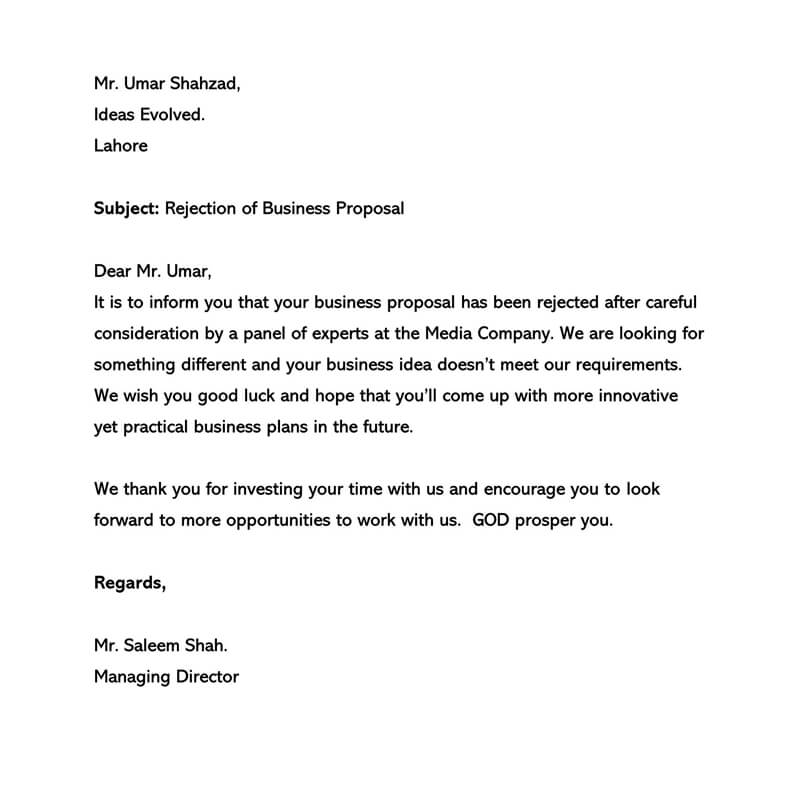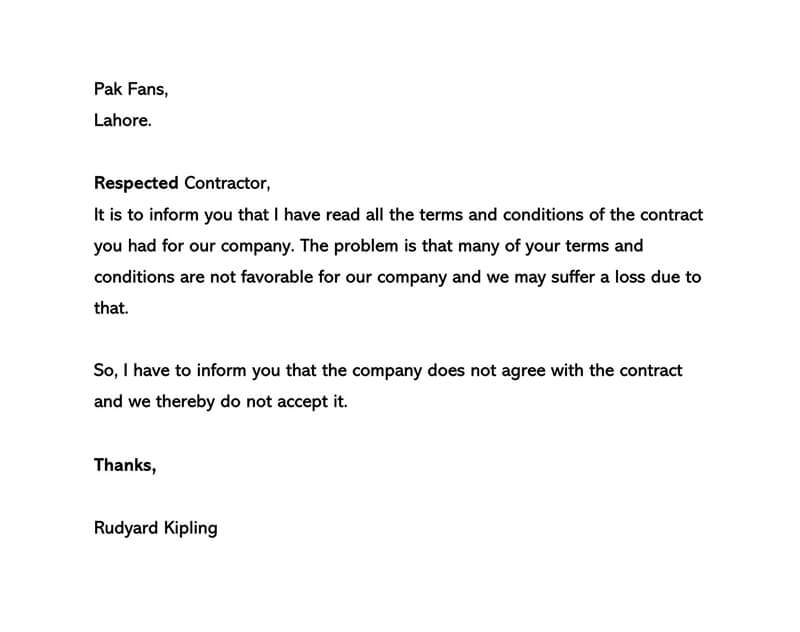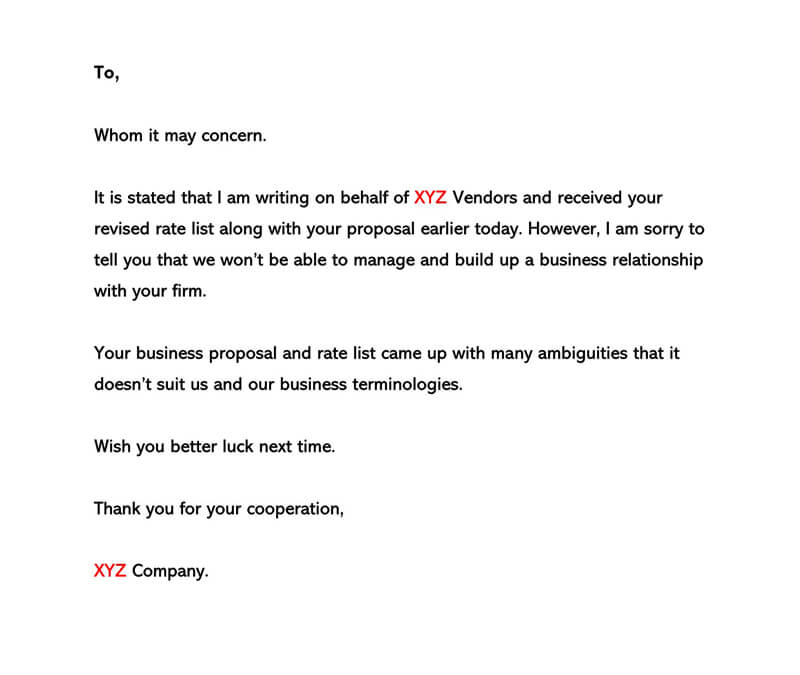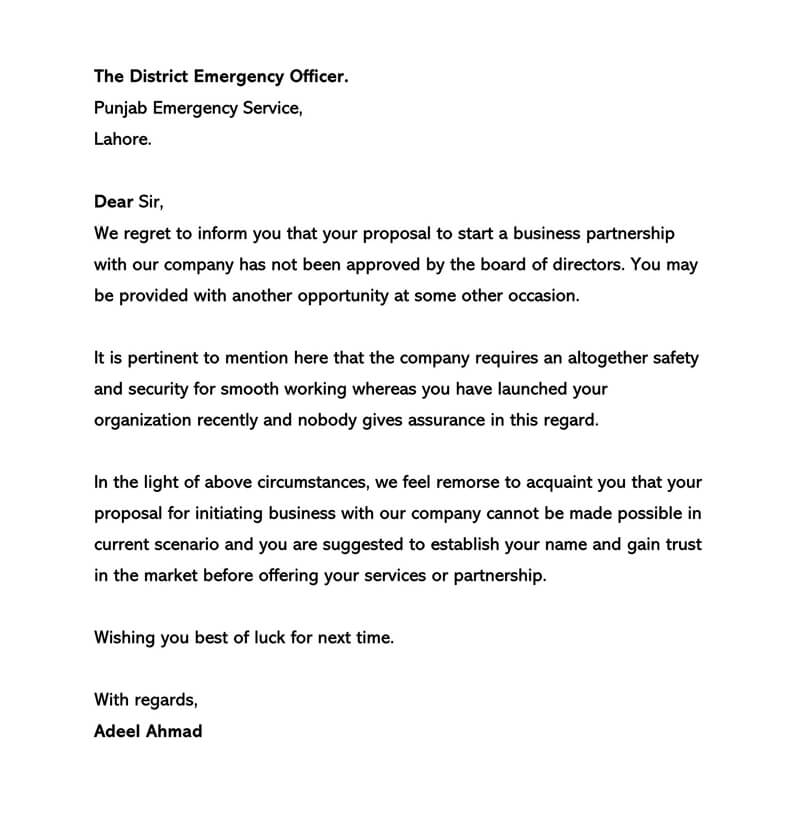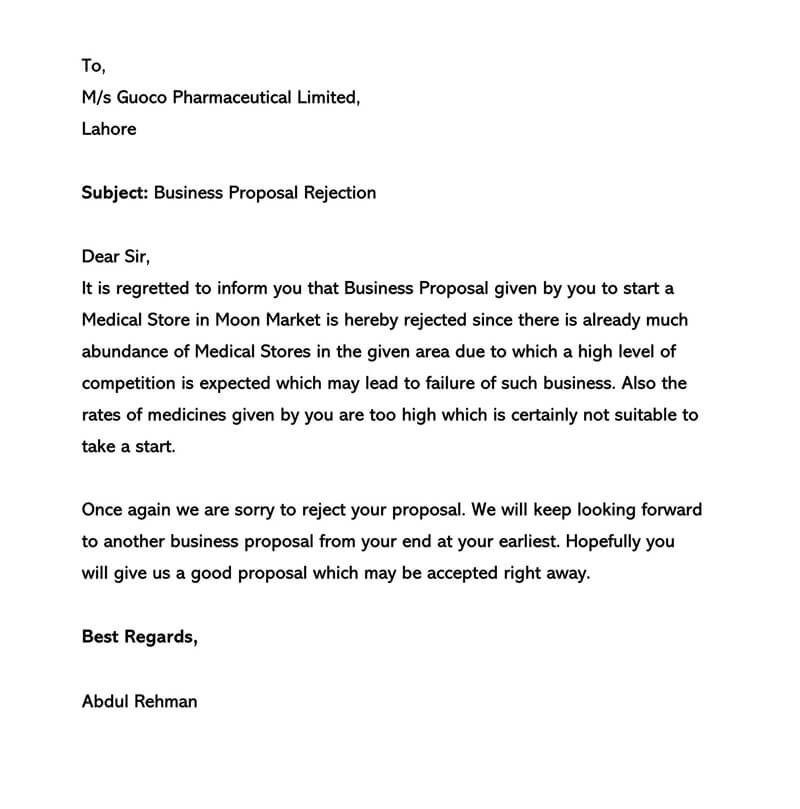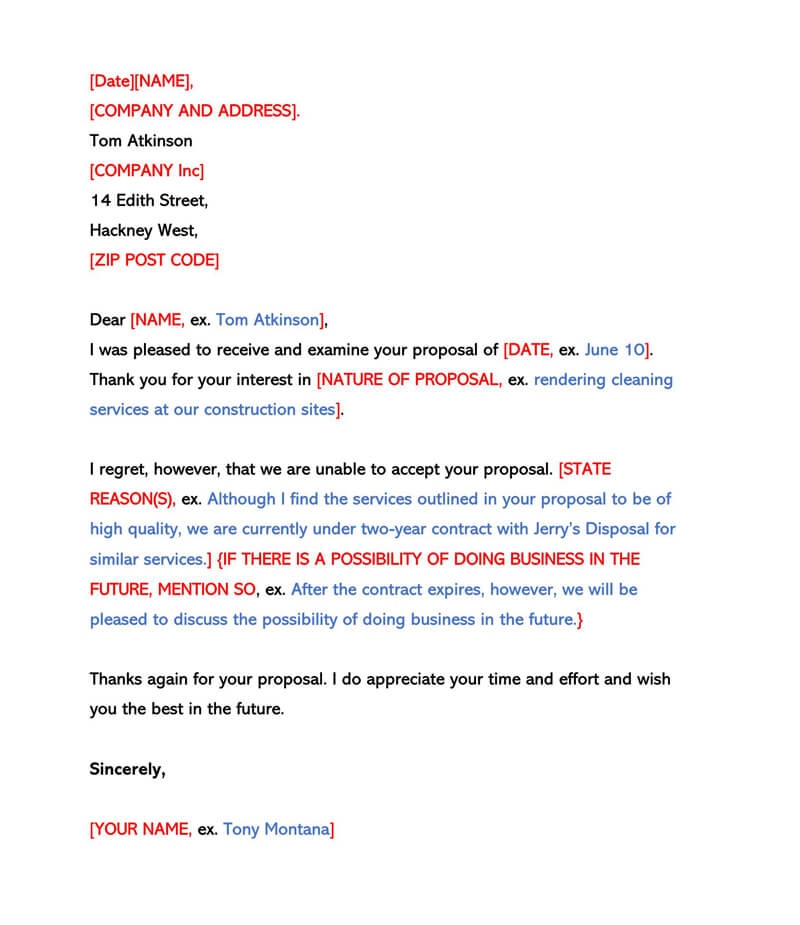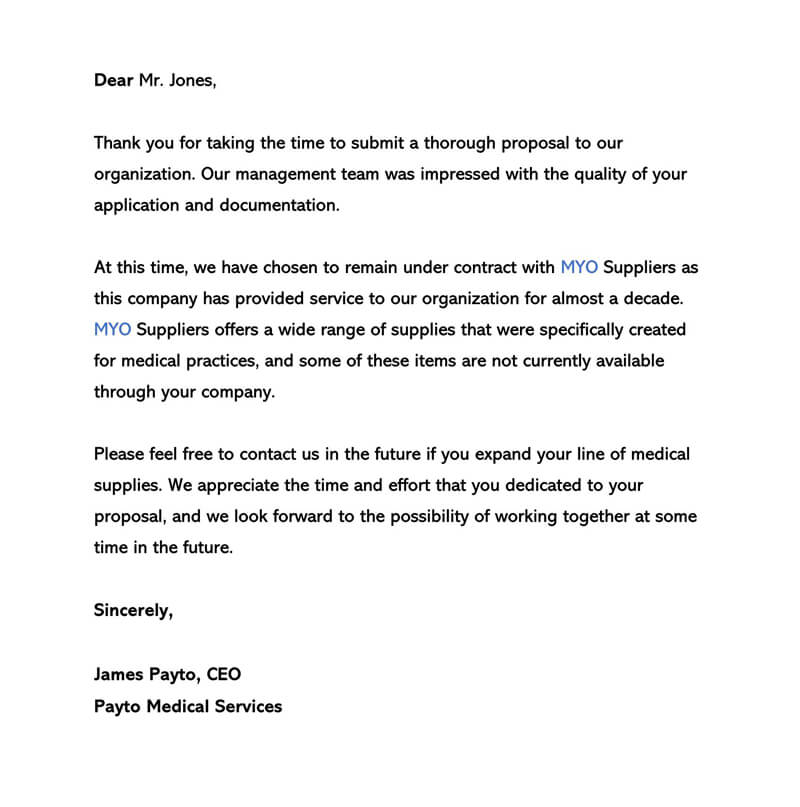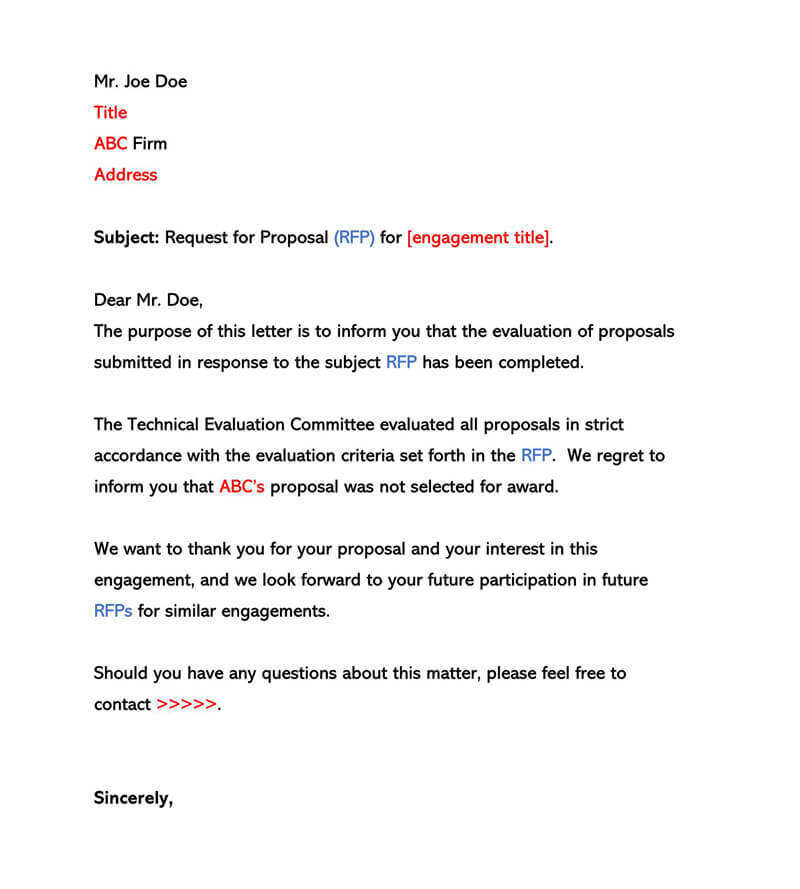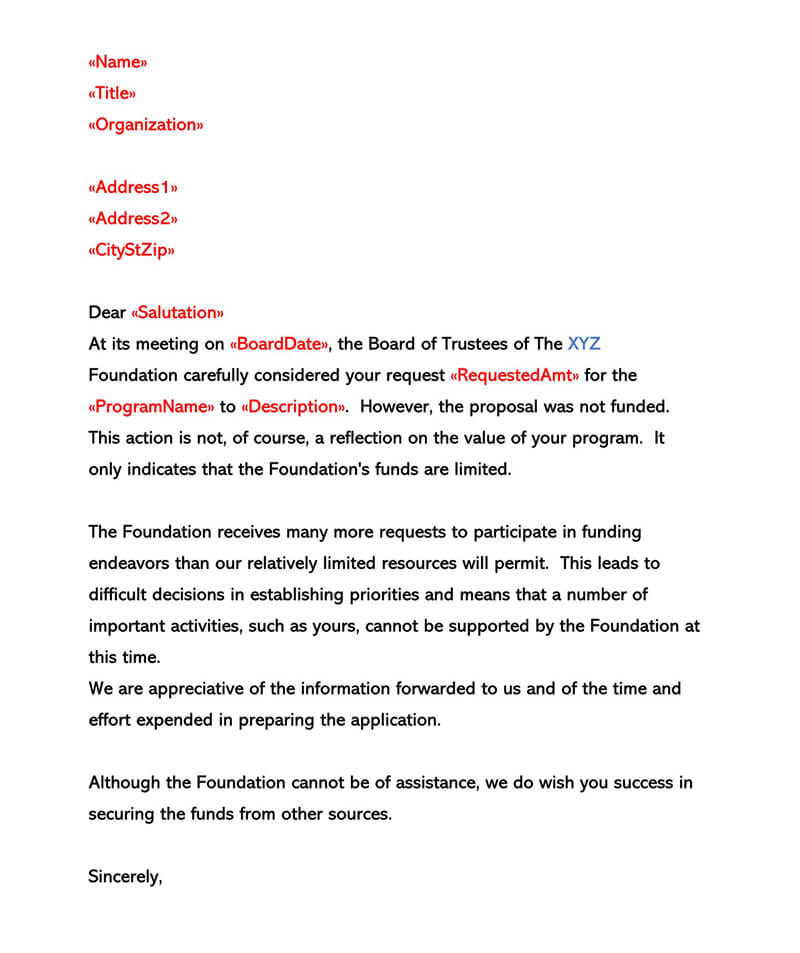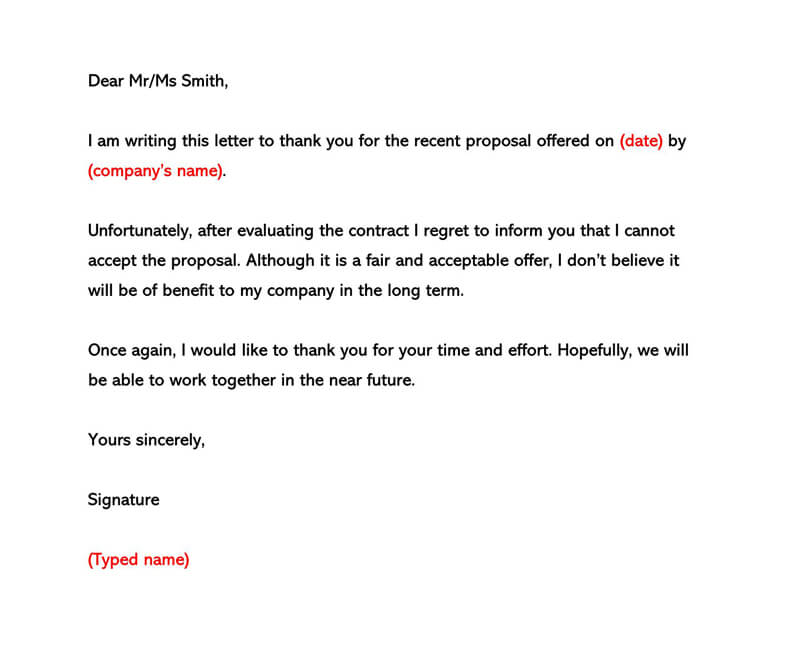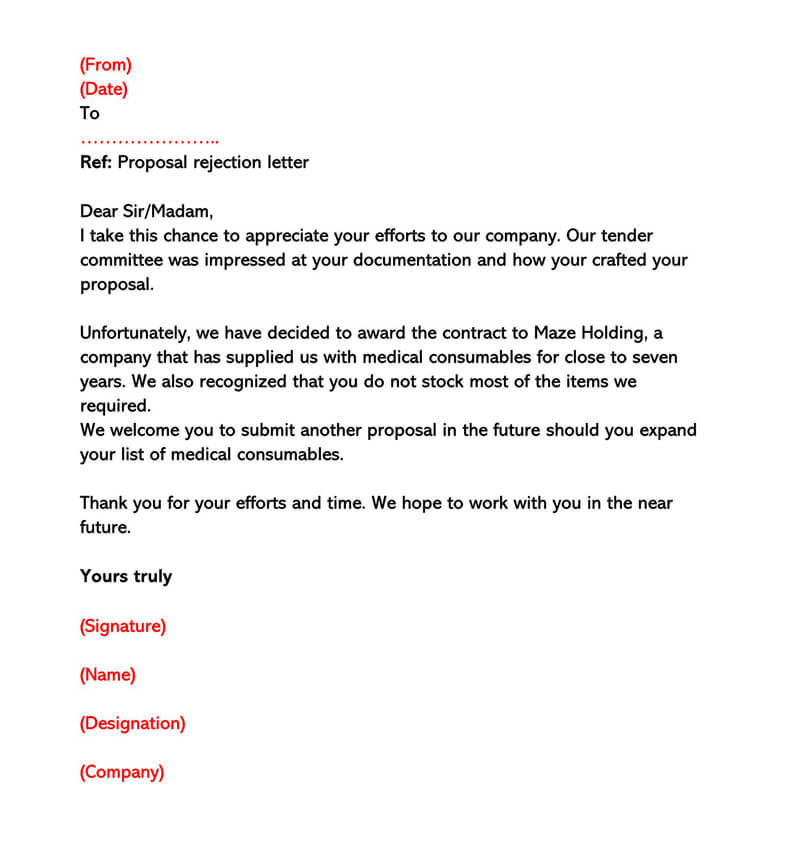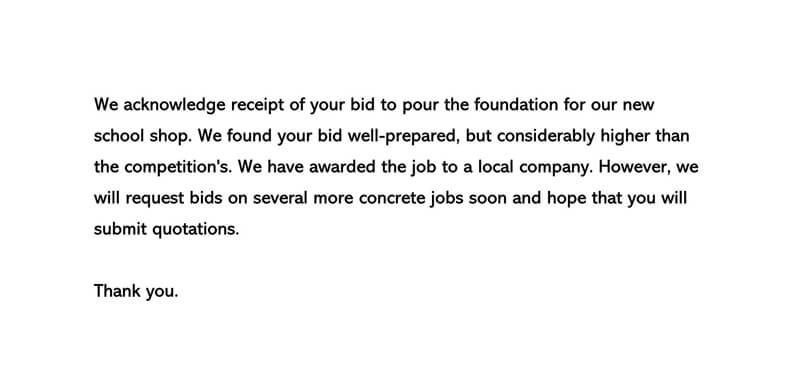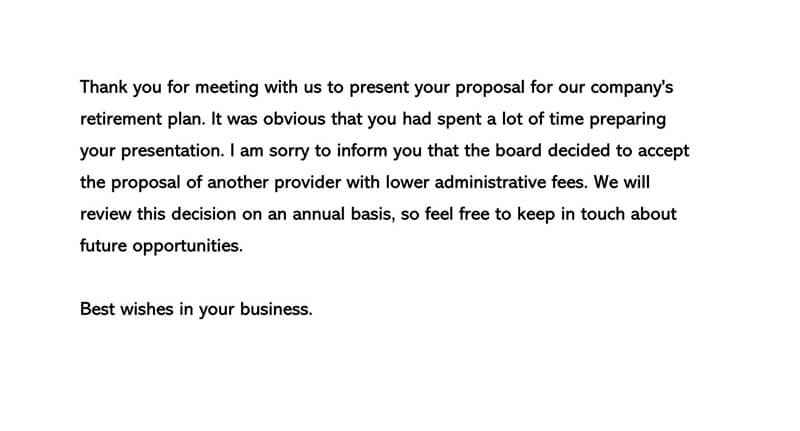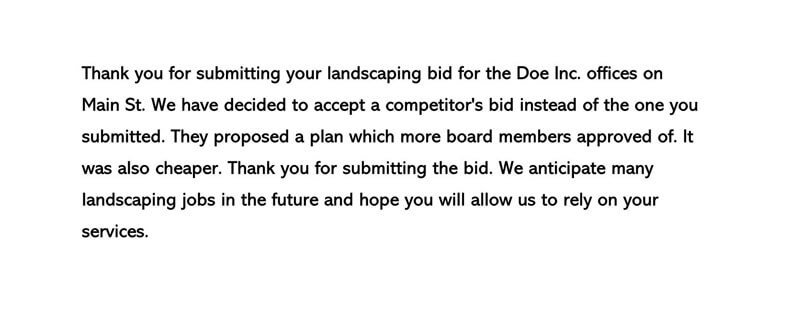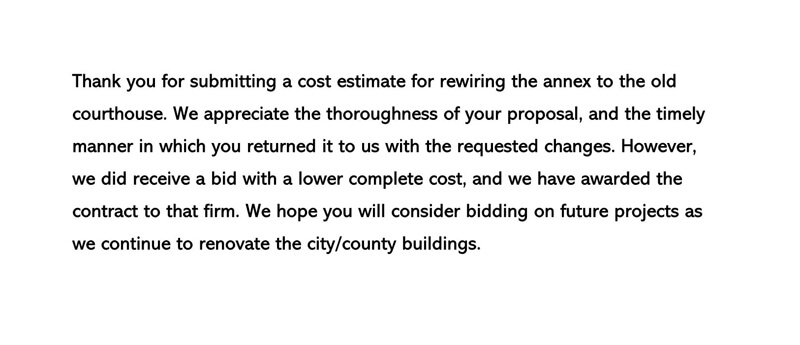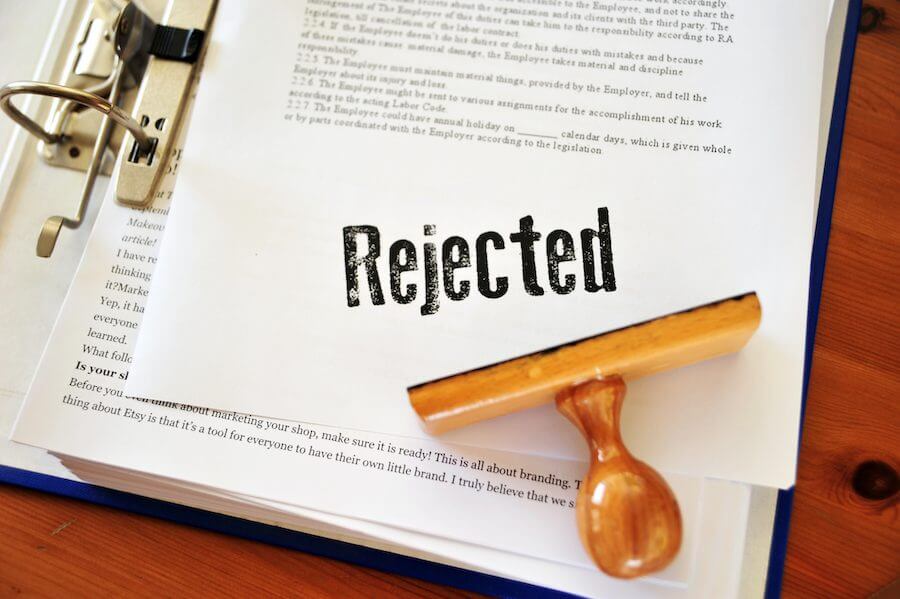A business proposal rejection letter is a letter businesses, companies, or organizations write to reject a bid. These are common letters in the business world that act as responses to companies that have submitted business proposals for specific projects.
The letter is written to express regret that the company didn’t meet the set guidelines or to inform them that the project was awarded to a competitor. Writing the letter requires the right words, tone, and format. If you have any doubts about writing the letter, consult the samples.
Business Proposal Rejection Letter Templates
Whether you’re a business owner or a decision-maker, a customizable template provides a respectful and well-crafted message, helping you maintain positive relationships and uphold your organization’s reputation. Streamline your rejection process with the following ready-to-use templates, available for free download in Word and PDF formats for your convenience.
What to Include in a Proposal Rejection Letter
A letter should include the information below:
- The official name of the person who has rejected the business proposal.
- When the proposal was received and the date that it was rejected.
- The intention of the letter is usually to state the rejection of the proposal.
- Reason for rejection.
- Where applicable, the people who were involved in the proposal review.
- The measures that the person who proposed may take should he or she want to improve the business proposal and move it forward again for future acceptance.
- The organization’s or entity’s contact information should the person who proposed have inquiries or other questions regarding the rejection of the proposal.
- The organization’s appreciation for the efforts done by the individual in drafting and creating the business proposal.
Reasons a Business Proposal Has Not Be Accepted
The proposal may be rejected due to the following items:
- Although a business proposal may be good, it may not have passed the initial requirements set by a certain company or business process, thereby prompting the entity to reject it.
- There is a chance that other proposals submitted by other individuals are better than the proposal you are submitting. A specific project may receive many different business proposals, especially if many people are involved in the project creation.
- An incomplete proposal may also be rejected, especially if there are essential items for the project missing.
- It may also be rejected if the business proposal submitted is not accurate for the purpose that it is intended for.
- The proposal panel screening may find areas of the proposal that need to be changed or improved, meaning that the rejection was due to improved processes and does not necessarily mean that there is no chance for a certain proposal to be used.
If you ever receive the rejection letter, review everything in the letter to know the items that became the basis for your proposal’s rejection. This will also allow you to know the areas you may need to improve and things to consider next time you are creating another business proposal.
Tips on How to Write a Business Proposal Rejection
- Offer a clear and valid reason for rejecting the business proposal. The recipient requires some explanation as to why their proposal didn’t sail through. This information will assist them in preparing better for the future.
- Use a polite tone. Since you’re communicating bad news, you need to use a respectful tone to say no. Your words should not humiliate the recipient.
- Be professional. The letter is a formal letter that should follow an official format.
- Express willingness to work with the client in the future, should they meet your requirements. As you terminate the letter, show optimism that you can work with the company if they make the relevant changes.
Business Proposal Rejection Template
[Your Name]
[Your Position]
[Your Company Name]
[Company Address]
[City, State, Zip Code]
[Your Email Address]
[Your Phone Number]
[Date]
[Recipient’s Name]
[Recipient’s Position]
[Recipient’s Company Name]
[Company Address]
[City, State, Zip Code]
Dear [Recipient’s Name],
I hope this message finds you well. I am writing on behalf of [Your Company Name] to express our sincere appreciation for the opportunity to review your proposal dated [Proposal Submission Date], regarding [Brief Description of the Proposal, e.g., partnership opportunity, service offering, project collaboration].
After careful consideration and thorough review by our team, we regret to inform you that we are unable to proceed with your proposal at this time. This decision was not made lightly. Our team conducted a comprehensive evaluation, taking into account various factors such as our current strategic priorities, resource allocations, and the fit of your proposal with our ongoing and future projects.
We are impressed by the thoughtfulness and effort evident in your submission. [Optional: Mention any specific aspects of the proposal that were particularly noteworthy, e.g., innovative approach, comprehensive analysis]. It is clear that [Recipient’s Company Name] is committed to excellence and innovation.
While we are unable to move forward with this particular proposal, we are open to exploring other potential opportunities for collaboration in the future. We believe that maintaining an open line of communication could pave the way for potential projects that align more closely with our mutual goals and capabilities.
Please accept our thanks once again for considering [Your Company Name] as a potential partner. We wish you the best of luck with this project and your future endeavors. Should you have any questions or wish to discuss future opportunities for collaboration, please do not hesitate to contact me directly at [Your Phone Number] or [Your Email Address].
Thank you for your understanding and for your interest in working with us.
Best regards,
[Your Name]
[Your Position]
[Your Company Name]
Sample Proposal Rejection Letters
Sample 01
Dear Mr. Marks,
I hope this letter finds you in good spirits. On behalf of TechSolutions Inc., I would like to extend my gratitude to you and your team at GreenTech Innovations for submitting your detailed proposal for the solar energy project, received on January 15, 20XX. Your approach to sustainable energy solutions and the comprehensive analysis provided in your proposal were received with great interest by our team.
After a thorough evaluation process, it is with regret that I inform you we have decided not to proceed with your proposal at this time. This decision was reached after careful consideration of our current strategic priorities and the alignment of proposed initiatives with our long-term sustainability goals. While your proposal was impressive in its innovation and thoroughness, we find ourselves in a position where we need to prioritize projects that are more closely aligned with our immediate operational requirements.
Please allow me to express our sincere appreciation for the effort and thoughtfulness that went into your proposal. The innovative technologies and commitment to environmental sustainability showcased in your submission clearly demonstrate GreenTech Innovations’ leadership in the field. It is evident that your team is pushing the boundaries of what is possible in sustainable energy solutions.
Although we will not be moving forward with this particular project, we are very much open to exploring other opportunities to collaborate in the future. The rapidly evolving nature of our industry suggests that there could be potential areas of synergy between our companies that may become apparent over time. We would welcome the chance to revisit discussions should a more suitable project align with our strategic goals.
Thank you once again for considering TechSolutions Inc. as a potential partner in your endeavors. We wish GreenTech Innovations continued success in your projects and innovations. Should there be any future initiatives you believe may align with our goals, please do not hesitate to reach out.
Should you have any questions or require further clarification, I am available for a discussion at your convenience. You can reach me directly at the contact information provided above.
Best regards,
Ava Chen
Director of Procurement
TechSolutions Inc.
SAMPLE 02
Dear Mr. Lee,
Warm greetings from Bright Horizons Educational Toys. I trust this letter finds you in good health and high spirits. Following our discussions and the detailed proposal you submitted on January 25, 20XX, for the integration of NextGen Educational Software into our upcoming line of interactive learning toys, I have thoroughly reviewed and considered the potential collaboration with great interest and enthusiasm.
Your innovative approach to blending technology with education to create immersive learning experiences is truly commendable. The dedication of NextGen Educational Software to revolutionizing the way children engage with educational content aligns well with our mission at Bright Horizons Educational Toys.
After careful analysis and internal consultation, it is with regret that I inform you we will not be moving forward with the proposed collaboration at this time. This decision was reached after considering our current product development cycle and market positioning strategy, which, for the immediate future, is focusing on physical toys without integrated software components. We believe that introducing a new technology-based product line requires a level of market preparation and consumer education that our current strategy does not support.
I want to emphasize that this decision does not reflect on the quality or potential impact of your proposal. On the contrary, we are very impressed with NextGen Educational Software’s vision and achievements in the educational technology space. It is our hope that this will not deter you from considering potential partnerships with Bright Horizons Educational Toys in the future as our strategies and market focus evolve.
We remain admirers of your work and are optimistic about the possibility of exploring collaborative opportunities at a later date when our strategic focus aligns more closely with your innovative solutions. The dynamic nature of our industry suggests that such an alignment is not only possible but likely.
Please accept our gratitude for considering Bright Horizons Educational Toys as a partner and for the effort and thoughtfulness put into your proposal. We wish NextGen Educational Software continued success in your endeavors and hope to have the opportunity to revisit potential collaboration in the future.
Should you wish to discuss this decision or share any future proposals you believe might align with our evolving product strategy, please feel free to reach out to me directly. I look forward to the possibility of working together to create engaging and educational experiences for children worldwide.
Thank you once again for your proposal and your understanding. Let’s keep the channels of communication open for future possibilities.
Best wishes,
Jasmine Patel
Head of New Ventures
Bright Horizons Educational Toys
Key Takeaways
The effectiveness of the two sample letters lies in their structure, tone, and the strategic delivery of unfavorable news, all while leaving the door open for future collaboration. Here’s an analysis of their strengths and effectiveness:
Polite and Positive Opening: Both letters start with a courteous greeting, expressing hope for the recipient’s well-being. This friendly introduction sets a positive tone, making the reader more receptive to the message that follows.
Gratitude and Recognition of Effort: The writers express appreciation for the proposals received, acknowledging the effort and thoughtfulness behind them. This recognition is crucial in maintaining a respectful and professional relationship despite the decision not to proceed.
Clear Communication of Decision: The decisions are conveyed clearly and directly, without ambiguity. This transparency ensures that the recipient understands the outcome of their proposal without any false expectations.
Rationale Behind the Decision: Each letter provides a reasoned explanation for the decision, linking it to strategic priorities, operational requirements, or market positioning strategies. Offering a rationale helps the recipient understand the context of the decision, reducing potential frustration or confusion.
Acknowledgment of Value and Quality: Despite the rejection, both letters emphasize the quality and potential impact of the proposals. By highlighting the strengths and innovations of the proposals, the writers maintain a positive relationship with the recipients, recognizing their expertise and contributions to their fields.
Openness to Future Opportunities: A key strength of both letters is their emphasis on future collaboration possibilities. The writers express interest in revisiting partnership opportunities should strategic goals or market conditions align, encouraging an ongoing relationship rather than a definitive end.
Offer to Continue Communication: The letters conclude with an offer to discuss the decision further and an invitation to present future proposals. This gesture reinforces the writer’s interest in maintaining open lines of communication and potentially working together in the future.
Professional and Warm Tone: The tone of both letters is professional yet warm, balancing the delivery of unfavorable news with a sense of optimism for future interactions. This approach helps preserve the dignity of the relationship and leaves a positive impression on the recipient.
In summary, these letters effectively communicate a decision not to proceed with a proposal while maintaining a respectful and positive relationship with the recipient. They demonstrate how to deliver difficult messages in a way that values the recipient’s efforts and leaves the door open for future collaborations, exemplifying effective and empathetic business communication.
More Tips
Generally speaking, everyone knows that it is not enjoyable to write a rejection letter because, at this point, you would be severing the hopes of an applicant or bidder. However, following the short guidelines below will assist you in writing the letter and delivering your message in the best way possible.
- Your letter should follow the standard format of a business letter.
- Make sure to use appropriate salutations or greeting tags, such as “Dear Mr. Terrence Silver.”
- If possible, always provide positive feedback or give positive criticism.
- Make your letter brief and straight to the point, formally and politely.
- Avoid telling your applicant or bidder about the person or company to whom you have awarded the project.
- Always keep your options open for future project opportunities.
- Finish your letter with an appropriate closing. For example, “Sincerely” or “Yours Truly.”
